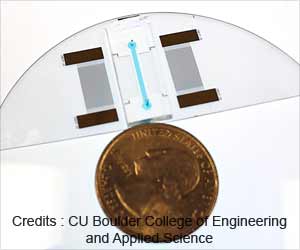
The findings were published online ahead of print publication in the American Thoracic Society's American Journal of Respiratory and Critical Care Medicine.
In the double-blind trial, 50 patients were randomized to receive fresh (median storage duration = 4.0 days) RBC and 50 were randomized to receive standard issue RBC (median storage duration = 26.5 days). The primary outcome measure was change in pulmonary gas exchange, as measured by the partial pressure of arterial oxygen to fraction of inspired oxygen concentration ratio (ΔPaO2/FiO2). Post-transfusion measurements were performed upon completion of the transfusion and within two hours of the transfusion (median 1.9 hours in the fresh RBC group and 1.8 hours in the standard issue RBC group).
No significant differences between groupswere seen in the primary outcome measure of change in PaO2/FiO2 ratio (2.5 +/- 49.3 vs. -9.0 +/- 69.8; fresh RBC vs. standard issue RBC; p = 0.22). Similarly, no significant differences were seen for any of the other outcome measures of pulmonary function (fraction of dead space ventilation, dynamic and static pulmonary compliance), immunologic status (tumor necrosis factor-alpha, interleukin-8, C-reactive protein) or coagulation status (fibrinogen, anti-thrombin consumption).
"Our data do not support a significant effect of RBC storage duration on respiratory, immunologic or coagulation parameters in the immediate post-transfusion period," said Dr. Kor. "Previous observational studies linking RBC storage duration and respiratory complications may have suffered from bias and unmeasured confounding, which were more effectively addressed in our double-blind, randomized trial study design."
The study did have some limitations, including the short duration of follow-up, the study's limited sample size and the single center, tertiary-care setting, which may limit the generalizability of the results.
Advertisement
Source-Eurekalert



![Pulmonary Arterial Hypertension [PAH] - Symptoms & Signs - Causes - Diagnosis - Treatment Pulmonary Arterial Hypertension [PAH] - Symptoms & Signs - Causes - Diagnosis - Treatment](https://www.medindia.net/images/common/patientinfo/120_100/pulmonary-arterial-hypertension-pah.jpg)






